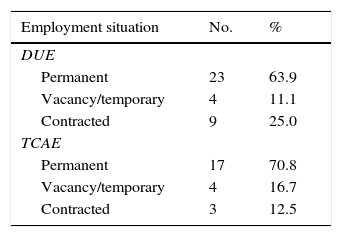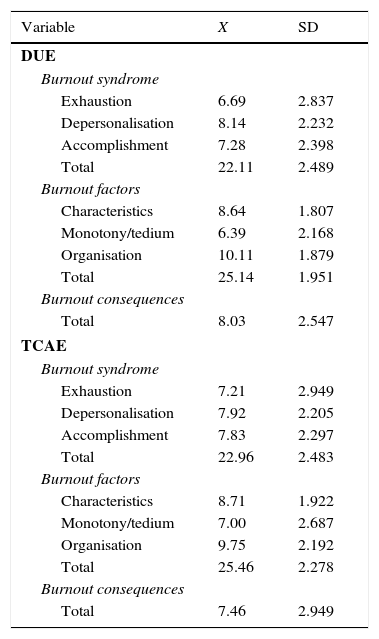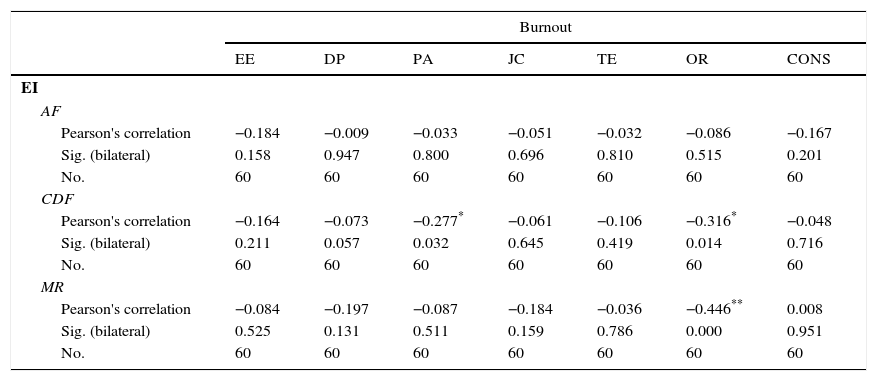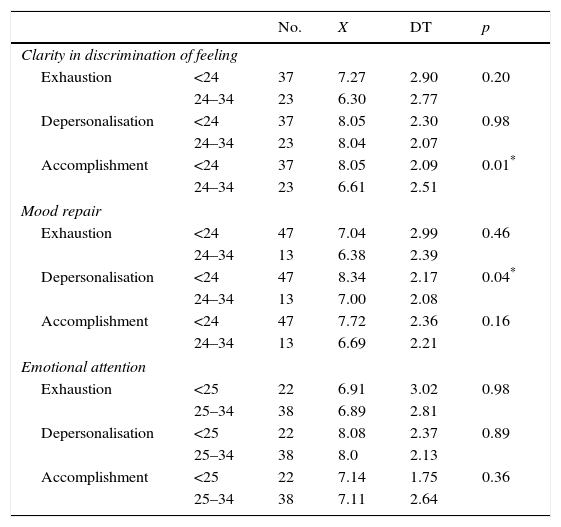To determine stress levels and to identify if there is a relationship between emotional intelligence and work stress in nurses and healthcare assistants of the Emergency Department.
MethodObservational, descriptive and cross-sectional study with a quantitative approach. The population were nurses and healthcare assistants of the Emergency Department of the University Hospital of Ourense. The data were collected between January and May 2016. The tool used was a validated, anonymous, and self-administered questionnaire that included the Trait Meta-Mood Scale and Moreno's Brief Burnout Questionnaire.
The study was approved by the Clinical Research Ethics Committee of Galicia. Descriptive and association analyses were performed using the SPSS 15.0 statistics programme.
ResultsA total of 60 professionals participated, of whom 36 were qualified nurses and 24 were auxiliary nurses. The response rate was 68.1%. The results showed a deficiency in emotional care, with a score of 22.87, while emotional clarity and reparation of emotions were situated within normal levels, with values of 26.42 and 26.60, respectively.
The burnout levels of the sample were medium-high. The mean score in the depersonalisation dimension was 8.05, whereas emotional fatigue obtained a mean of 6.90, with a value of 7.50 for professional fulfilment.
Significant positive correlations were found between the employment situation and emotional clarity (r=0.276; p=0.033), and between the latter and personal fulfilment (r=0.277; p=0.032), and organisation (r=0.316; p=0.014).
ConclusionsNurses and healthcare assistants of the Emergency Department showed medium-high average levels of burnout, with depersonalisation being the symptom that reflects the highest values.
Emotional Intelligence is related to work stress and, specifically, the understanding of one's own emotional states influences personal fulfilment. Professionals with more job stability show a better capacity to feel and express their feelings.
Determinar los niveles de estrés e identificar si existe relación entre la inteligencia emocional y el estrés laboral en enfermeras y auxiliares de enfermería del Servicio de Urgencias del Complexo, Hospitalario Universitario de Ourense.
MétodoEstudio observacional, descriptivo transversal con enfoque cuantitativo. La población de estudio fueron las enfermeras y auxiliares de enfermería del Servicio de Urgencias del Complexo Hospitalario Universitario de Ourense. La recogida de datos se llevó a cabo entre enero y mayo de 2016. Como instrumento se utilizó un cuestionario anónimo y autoadministrado que incluía el Trait Meta-Mood Scale y el Cuestionario breve de burnout.
Se realizó un análisis descriptivo y de asociación de variables utilizando el programa SPSS 15.0. El estudio fue aprobado por el CEIC de Galicia.
ResultadosParticiparon un total de 60 profesionales, de los cuales, 36 eran enfermeras y 24 técnicos en cuidados auxiliares de Enfermería. La tasa de respuesta fue de un 68,1%. Los resultados mostraron un déficit en el área de atención emocional, con una puntuación de 22,87, situándose la claridad emocional y la reparación de emociones en valores normales, con valores de 26,42 y 26,60, respectivamente.
Los niveles de burnout muestran unas puntuaciones totales medias entre los 22,11 puntos para las enfermeras y 22,96 para los técnicos auxiliares de cuidados. La puntuación media obtenida en la dimensión de despersonalización fue de 8,05, en cansancio emocional 6,90 y en el componente de realización profesional 7,50.
Se encontraron correlaciones positivas estadísticamente significativas entre la situación laboral y la claridad emocional (r=0,276; p=0,033) y entre esta y la realización personal (r=0,277; p=0,032) y la organización (r=0,316; p=0,014).
ConclusionesLos profesionales de Enfermería del servicio de urgencias presentan niveles medios-altos de burnout, siendo la despersonalización el síntoma que refleja los valores más elevados.
La inteligencia emocional está relacionada con el estrés laboral y, de manera específica, la comprensión de los propios estados emocionales influye en la realización personal. Los profesionales con más estabilidad laboral muestran una mejor capacidad para sentir y expresar sus sentimientos.










